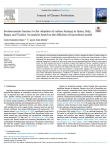Gonzales-Gemio C., Sanz-Martín L. (2025). Socioeconomic barriers to the adoption of carbon farming in Spain, Italy, Egypt, and Tunisia: an analysis based on the diffusion of innovations model. Journal of Cleaner Production, 20/03/2025, vol. 498, p. 145155.
https://doi.org/10.1016/j.jclepro.2025.145155
https://doi.org/10.1016/j.jclepro.2025.145155
| Titre : | Socioeconomic barriers to the adoption of carbon farming in Spain, Italy, Egypt, and Tunisia: an analysis based on the diffusion of innovations model (2025) |
| Auteurs : | C. Gonzales-Gemio ; L. Sanz-Martín |
| Type de document : | Article |
| Dans : | Journal of Cleaner Production (vol. 498, March 2025) |
| Article en page(s) : | p. 145155 |
| Langues : | Anglais |
| Langues du résumé : | Anglais |
| Catégories : |
Catégories principales 06 - AGRICULTURE. FORÊTS. PÊCHES ; 6.4 - Production Agricole. Système de ProductionThésaurus IAMM AGRICULTURE BIOLOGIQUE ; SYSTEME DE PRODUCTION ; ADOPTION DE L'INNOVATION ; DIFFUSION DE L'INNOVATION ; ESPAGNE ; ITALIE ; EGYPTE ; TUNISIE |
| Résumé : | The adoption of carbon farming in Mediterranean regions is crucial to mitigate the effects of climate change on agriculture. However, its implementation remains limited due to socio-economic and technical barriers. To better understand this phenomenon, the study is framed by the diffusion of innovations model, which provides an analytical framework to assess how, why and at what rate new agricultural practices diffuse in a given population. This study examines the barriers to adoption in Spain, Italy, Egypt and Tunisia. A qualitative analysis of interviews with 20 farmers from these countries, along with a literature review, reveals that while the environmental benefits-such as improved soil health and biodiversity-are widely recognized, economic disincentives, uncertainty over carbon credits and resistance to change hinder adoption. The complexity of carbon farming techniques and limited access to specialized equipment slow down diffusion further, especially in rural areas where information dissemination is ineffective. In addition, the lack of immediate economic benefits discourages investment, while the misalignment with traditional farming practices fosters skepticism. To improve uptake, the study stresses the need for clearer financial mechanisms, targeted educational programs and policy adjustments that add value to traditional farming practices. |
| Cote : | En ligne |
| URL / DOI : | https://doi.org/10.1016/j.jclepro.2025.145155 |







